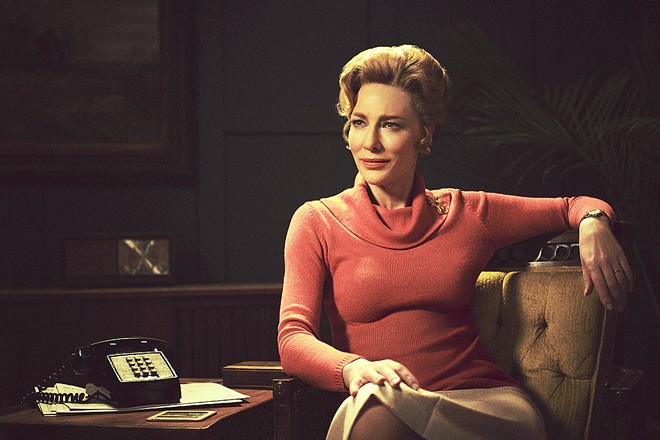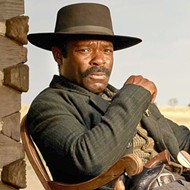
Photo Courtesy Of FX Productions
RIGHT V. LEFT In Mrs. America, conservative activist Phyllis Schlafly (Cate Blanchett) mounts a grassroots campaign to block the passage of the Equal Rights Amendment, which she believes will strip women of their special privileges.
[{
"name": "Ad - Medium Rectangle CC01 - 300x250",
"id": "AdMediumRectangleCC01300x250",
"class": "inlineCenter",
"insertPoint": "8",
"component": "2963441",
"requiredCountToDisplay": "12"
},{
"name": "Ad - Medium Rectangle LC01 - 300x250",
"id": "AdMediumRectangleCC01300x250",
"class": "inlineCenter",
"insertPoint": "18",
"component": "2963441",
"requiredCountToDisplay": "22"
},{
"name": "Ad - Medium Rectangle LC09 - 300x250",
"id": "AdMediumRectangleLC09300x250",
"class": "inlineCenter",
"insertPoint": "28",
"component": "3252660",
"requiredCountToDisplay": "32"
}]
Mrs. America is a nine-part miniseries created by Dahvi Waller that examines the attempt to pass the Equal Rights Amendment (ERA) hailed by second-wave feminists Gloria Steinem (Rose Byrne), Betty Friedan (Tracey Ullman), Shirley Chisholm (Uzo Aduba), Bella Abzug (Margo Martindale), and Jill Ruckelshaus (Elizabeth Banks) and fought against by conservative activist Phyllis Schlafly (Cate Blanchett) during the culture wars of the 1970s. (Nine 43 to 54 min. episodes).
Glen Based loosely on the events surrounding the 1970s-era failed attempt to ratify the ERA, which proposed a constitutional guarantee of equal rights regardless of sex, Mrs. America examines the personalities of the major players during this fascinating time. First posed back in 1923, the ERA seemed like it was almost a slam dunk for passage in the 1970s, but then along came Phyllis Schlafly (played with amazing nuance by Blanchett), who organized a cadre of conservative housewives to mount a grassroots campaign to defeat it. These women feared the ERA would take away women's rights and perhaps make them eligible for the draft; remove protections regarding divorce, estate settlement, and alimony; and force women who wanted to be homemakers into the workforce. It sort of makes my head spin that this obviously just addition to the U.S. Constitution remains in limbo, all but dead. Crazy!
Anna Schlafly is the perfect picture of a stylistic, conservative housewife who was dutiful in caring for both her lawyer husband and their six children. If this depiction characterizes it correctly, she wasn't even wholly interested in the ERA to start with, but when the opportunity came to be the poster child of all things STOP ERA, Schlafly jumped in with both feet. She is clever and cunning, well-to-do and charming—and the moments when we see her façade start to crumble are few and far between. While championing the rights of housewives to stay in the home, she herself starts to dream big about law school and future political assignments. The tug-of-war inside is real, and Blanchette is simply fantastic as the poised but passionate woman determined to shoo away women's lib. This is a frustrating and wholly fascinating character for her to take on.
Glen I also loved the dynamics between the feminist cadre. The younger ones think Friedan is too shrewish and politically unsophisticated. Yes, she ushered in second-wave feminism with her 1957 book The Feminine Mystique, but for firebrands like Gloria Steinem, Friedan is a throwback and doesn't understand the changing political dynamics of the '70s. Steinem and others fear Friedan will undermine their efforts to pass the ERA. Little do they know what a formidable foe they have in Schlafly. Of course, we know the outcome of this fight, and so far only five of the nine episodes have been released (six by the time you read this, as they come out on Wednesday nights), but this a compelling drama about political dynamics that are worth revisiting. It's also very well made, with great performances, amazing sets and costumes, and a real feel for the era.
Anna The dynamics between both sides are really fascinating. Even within Schlafly's group of women fighting the ERA there is division. When she suggests a name for the movement that includes her name and is shot down by the rest of the group in favor of STOP ERA, you can feel her frustration boiling under the surface of her very manicured demeanor. She had unsuccessfully run for Congress in 1952 and hadn't seemed to get over the loss by the time she took on the ERA. She's tired of being labeled as only a wife; she wants power she doesn't have to share or give to her husband—yet the very thing she defends encourages that old-school thinking and behavior. These are tremendous performances from Byrne, Aduba, and Martindale along with many others throughout the series. It manages to be both infuriating and delicious. I love that they are releasing it in three-part chunks—you can binge a bit but still have the tantalizing task of waiting another week for more. Check this one out: It's dazzling in every way it can be. Δ
Senior Staff Writer Glen Starkey and freelancer Anna Starkey write Split Screen. Glen compiles streaming listings. Comment at [email protected].
Latest in Movies
Comments
Showing 1-1 of 1









